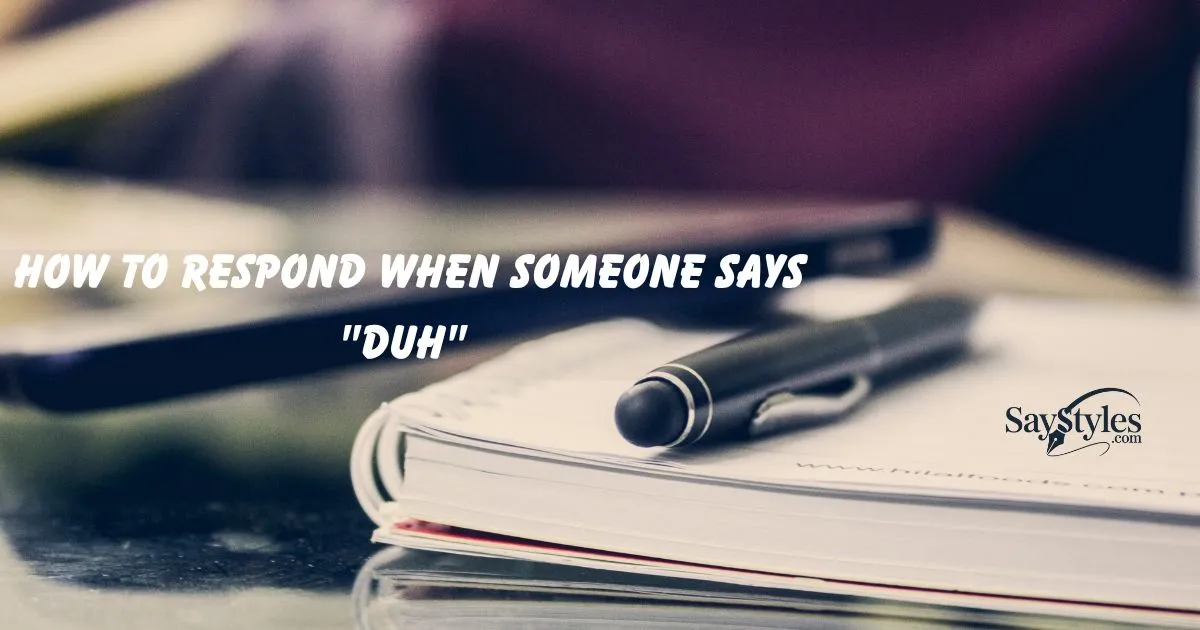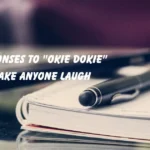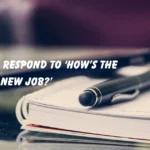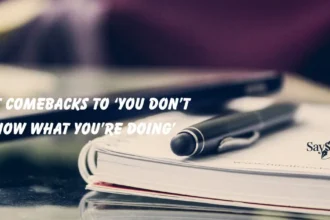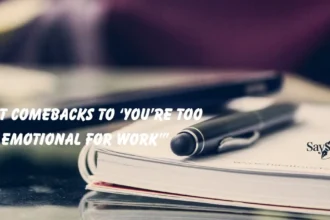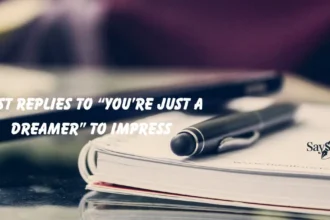A clever response can say more than a loud reaction. When someone hits you with a “Duh,” it can feel like a jab—maybe a little sarcastic, maybe a bit condescending. It might seem like they’re questioning your common sense or trying to look smarter. But don’t worry—there’s a smarter way to handle it.
This guide is packed with simple, respectful, and even funny ways to respond when someone says “Duh.” Whether you’re trying to use emotional intelligence, keep your cool, or give a witty comeback, we’ve got you covered. You’ll learn how to keep the conversation light, stay confident, and use your communication skills to handle any rude remark with style.
In this article, you’ll discover clever retorts, smart responses, and examples that help you stay calm, funny, and polite. No drama, just cool-headed replies that show who you really are.
“I guess someone’s been paying attention!”
Story: Sarah noticed that Tom remembered small details from their last meeting and called him out playfully.
When to Use: Use this when someone catches on quickly or remembers something important without prompting.
When Not to Use: Avoid this if the person didn’t actually pay attention or if it could sound sarcastic in serious situations.
Example:
Sarah: “You remembered my favorite coffee order?”
Tom: “Yeah, I guess someone’s been paying attention!”
How to Respond 🗣️
“Well, I try my best!”
“Got to keep up with you!”
“Of course, I was listening.”
“Well, aren’t you the genius?”
Story: Mark cracked a tough problem at work and Jenna teased him.
When to Use: Use this phrase in a lighthearted way when someone solves a problem or shows cleverness.
When Not to Use: Don’t use it when someone feels insecure or if they might take it as mocking.
Example:
Jenna: “You figured out the solution already? Well, aren’t you the genius?”
Mark: “Haha, just lucky today!”
How to Respond 🗣️
“Guess I’m on a roll!”
“Thanks, I’ll take that as a compliment.”
“Just doing my part.”
“Thanks for stating the obvious!”
Story: Emily said something very clear, and John joked about it being obvious.
When to Use: Use when someone says something very clear or already known, in a playful way.
When Not to Use: Avoid if it sounds rude or if the person is genuinely trying to help.
Example:
Emily: “The sky is blue today.”
John: “Thanks for stating the obvious!”
How to Respond 🗣️
“Just making sure we’re clear!”
“Sometimes it needs to be said.”
“Well, you never know.”
“Aren’t you just a bundle of insights?”
Story: Lisa kept sharing interesting ideas during the team meeting, and David gave her this playful compliment.
When to Use: Use when someone offers a lot of smart or helpful ideas in a friendly way.
When Not to Use: Avoid this if the person might feel like you’re mocking their input or if it sounds sarcastic.
Example:
David: “Aren’t you just a bundle of insights?”
Lisa: “Thanks, I have been thinking about it a lot!”
How to Respond 🗣️
“Glad you noticed!”
“I try to keep the ideas flowing.”
“Just sharing what I see.”
“Oh, so you’re the expert now?”
Story: Mike made a confident statement about a topic he recently learned, and Nina teased him.
When to Use: Use this when someone suddenly sounds very confident or like they know it all in a playful way.
When Not to Use: Don’t use it to belittle someone or if they’re seriously trying to share knowledge.
Example:
Nina: “Oh, so you’re the expert now?”
Mike: “Hey, I’ve done my homework!”
How to Respond 🗣️
“Learning every day!”
“I’m getting there.”
“Guess I’m on my way to expert status.”
“I’m just making sure we’re on the same page!”
Story: Anna noticed Jack seemed confused during their discussion and said this to clarify things.
When to Use: Use this phrase to confirm understanding during conversations or teamwork.
When Not to Use: Avoid if it sounds like you’re questioning someone’s intelligence or being passive-aggressive.
Example:
Anna: “I’m just making sure we’re on the same page about the project deadline.”
Jack: “Got it, thanks for checking!”
How to Respond 🗣️
“Absolutely, we’re aligned.”
“Thanks for clarifying!”
“Good idea, better safe than sorry.”
“Well, someone’s got their thinking cap on!”
Story: Chris came up with a creative solution, and Maria encouraged him with this phrase.
When to Use: Use when someone is showing focus or creative thinking in a fun way.
When Not to Use: Don’t say it if someone is struggling or feeling frustrated, as it may sound insensitive.
Example:
Maria: “Well, someone’s got their thinking cap on!”
Chris: “Finally, the idea came through!”
How to Respond 🗣️
“Trying my best!”
“Glad it’s working out.”
“Brainstorming mode activated.”
“You’re full of surprises, aren’t you?”
Story: Emma did something unexpected but impressive, and Lucas reacted with this compliment.
When to Use: Use this to praise someone who shows unexpected talent or does something out of character.
When Not to Use: Avoid if the surprise might be negative or if it sounds sarcastic.
Example:
Lucas: “You’re full of surprises, aren’t you?”
Emma: “Didn’t expect that, huh?”
How to Respond 🗣️
“Just keeping things interesting!”
“Glad you liked it.”
“Sometimes surprises are good!”
“Looks like someone’s got it all figured out!”
Story: Ben solved a problem quickly, and Rachel praised him this way.
When to Use: Use this to compliment someone who seems very confident or knowledgeable.
When Not to Use: Avoid if the person is uncertain or if it may sound like you’re mocking them.
Example:
Rachel: “Looks like someone’s got it all figured out!”
Ben: “I’m getting there.”
How to Respond 🗣️
“Step by step!”
“Thanks for noticing.”
“I’m learning as I go.”
See also: Funny Responses to “Okie Dokie” That’ll Make Anyone Laugh
“Did you just become a know-it-all?”
Story: Olivia suddenly started sharing a lot of information on a topic, and Matt teased her.
When to Use: Use in a playful tone when someone shares lots of knowledge or facts.
When Not to Use: Avoid if the person might feel offended or if the situation is serious.
Example:
Matt: “Did you just become a know-it-all?”
Olivia: “Just trying to keep you informed!”
How to Respond 🗣️
“Guilty as charged!”
“I like to be prepared.”
“Sharing is caring!”
“Wow, you’re really on a roll today!”
Story: Jake kept answering questions correctly during a quiz, and Zoe cheered him on.
When to Use: Use when someone is doing very well or succeeding repeatedly.
When Not to Use: Avoid if the person is struggling or if it sounds like pressure.
Example:
Zoe: “Wow, you’re really on a roll today!”
Jake: “Thanks! Feels great.”
How to Respond 🗣️
“Can’t stop now!”
“Thanks for the support!”
“Let’s keep it going.”
“And here I thought I was the genius!”
Story: Lily joked when Eric came up with a clever idea before her.
When to Use: Use to playfully admit someone else is smarter or quicker.
When Not to Use: Don’t use it if it might hurt someone’s feelings or seem jealous.
Example:
Lily: “And here I thought I was the genius!”
Eric: “You’re still number one!”
How to Respond 🗣️
“Teamwork wins!”
“Sharing the genius title.”
“You inspire me!”
“You should start your own advice column!”
Story: Tom gave great advice to Rachel during a tough situation.
When to Use: Use to praise someone’s good advice or wisdom in a friendly way.
When Not to Use: Avoid if the advice was not helpful or if the person feels uncomfortable.
Example:
Rachel: “You should start your own advice column!”
Tom: “Maybe one day!”
How to Respond 🗣️
“Glad it helped.”
“I’ll keep the advice coming.”
“Thanks for the encouragement!”
“Glad to see you’re paying attention!”
Story: Kevin noticed Anna caught a subtle hint in their conversation and appreciated it.
When to Use: Use this to encourage someone who is being attentive or alert.
When Not to Use: Avoid if it sounds like you’re criticizing someone who missed something important.
Example:
Kevin: “Glad to see you’re paying attention!”
Anna: “Always, I don’t want to miss a thing.”
How to Respond 🗣️
“Trying my best!”
“Thanks for noticing.”
“Can’t afford to miss details.”
“Are you always this observant?”
Story: Megan admired how David noticed a small change in their surroundings.
When to Use: Use this when someone notices details others might miss, in a friendly tone.
When Not to Use: Avoid if it sounds sarcastic or like a backhanded compliment.
Example:
Megan: “Are you always this observant?”
David: “I guess it runs in the family.”
How to Respond 🗣️
“Just paying attention.”
“Guess so, it’s a habit.”
“Thanks, I try!”
“Well, aren’t you a quick learner!”
Story: Sarah picked up a new skill faster than expected, and James complimented her.
When to Use: Use to praise someone who understands or adapts quickly.
When Not to Use: Avoid if the person is still struggling or feels pressured.
Example:
James: “Well, aren’t you a quick learner!”
Sarah: “Thanks! I’ve been practicing a lot.”
How to Respond 🗣️
“Practice pays off.”
“Glad to hear that.”
“I’m picking up fast!”
“You’re on fire today!”
Story: Mike was having a streak of good luck or success, and Jenna cheered him on.
When to Use: Use to encourage someone who is doing very well.
When Not to Use: Avoid if it could pressure someone or seem sarcastic if they’re not doing well.
Example:
Jenna: “You’re on fire today!”
Mike: “Thanks! Everything’s clicking.”
How to Respond 🗣️
“Let’s keep it going!”
“Feeling unstoppable!”
“Thanks for the support.”
“I see someone’s been studying!”
Story: Olivia showed impressive knowledge in a discussion, and Ben noticed.
When to Use: Use to recognize when someone clearly prepared or learned something new.
When Not to Use: Avoid if it sounds condescending or if the person is guessing.
Example:
Ben: “I see someone’s been studying!”
Olivia: “Yep, I wanted to be ready.”
How to Respond 🗣️
“Had to put in the work.”
“Thanks, I’m learning!”
“Trying to stay sharp.”
“You must be a pro at this!”
Story: Rachel watched David handle a task with great skill and praised him.
When to Use: Use to compliment someone’s expertise or smooth handling of a task.
When Not to Use: Avoid if the person is still learning or feels insecure.
Example:
Rachel: “You must be a pro at this!”
David: “Thanks, I’ve done it a few times.”
How to Respond 🗣️
“Experience helps.”
“Still learning every day.”
“Appreciate that!”
“I’m impressed by your insight!”
Story: Anna shared a thoughtful opinion during a meeting, and Kevin expressed admiration.
When to Use: Use to show respect for someone’s deep understanding or perspective.
When Not to Use: Avoid if it sounds patronizing or overused.
Example:
Kevin: “I’m impressed by your insight!”
Anna: “Thanks, I’ve been thinking about it.”
How to Respond 🗣️
“Glad you found it useful.”
“Happy to share my thoughts.”
“Thanks for listening.”
“You’re like a walking encyclopedia!”
Story: Emma amazed Jack by knowing a lot of facts during their trivia night.
When to Use: Use this to compliment someone who has vast knowledge about many topics.
When Not to Use: Avoid if it may make the person feel pressured to know everything.
Example:
Jack: “You’re like a walking encyclopedia!”
Emma: “I do love my facts!”
How to Respond 🗣️
“Thanks, I enjoy learning.”
“Just a curious mind.”
“Glad I could help.”
“Looks like someone’s got all the answers!”
Story: Olivia quickly solved a tricky problem at work, and Mike praised her.
When to Use: Use to admire someone who confidently provides solutions.
When Not to Use: Avoid if it sounds sarcastic or if the person is unsure.
Example:
Mike: “Looks like someone’s got all the answers!”
Olivia: “Just trying my best.”
How to Respond 🗣️
“Thanks! Happy to help.”
“I’m learning every day.”
“Appreciate that.”
“You should be the one giving advice!”
Story: David gave solid advice during a tough conversation, and Sarah encouraged him.
When to Use: Use to recognize someone’s helpful guidance.
When Not to Use: Avoid if the advice was not useful or poorly received.
Example:
Sarah: “You should be the one giving advice!”
David: “Thanks, I’m glad it helped.”
How to Respond 🗣️
“Happy to support.”
“Glad it made a difference.”
“Thanks for saying that!”
“Well, aren’t you just a fountain of knowledge!”
Story: Megan shared detailed information during a team meeting, and Ben was impressed.
When to Use: Use to compliment someone who shares useful knowledge generously.
When Not to Use: Avoid if it sounds overwhelming or sarcastic.
Example:
Ben: “Well, aren’t you just a fountain of knowledge!”
Megan: “I try to keep us informed.”
How to Respond 🗣️
“Glad to help.”
“Information is power!”
“Thanks, I love learning.”
“You’re like a trivia champion!”
Story: Jake answered every question right in a game night, and Zoe praised him.
When to Use: Use to celebrate someone’s quick recall or broad knowledge.
When Not to Use: Avoid if the person feels competitive pressure or uncomfortable.
Example:
Zoe: “You’re like a trivia champion!”
Jake: “Thanks! It’s fun.”
How to Respond 🗣️
“Love a good challenge.”
“Thanks, I’m on a roll!”
“Glad you noticed.”
“You’ve got all the right answers!”
Story: Anna confidently solved a difficult test question, and Kevin admired her.
When to Use: Use to encourage someone who provides correct or insightful answers.
When Not to Use: Avoid if the person is unsure or making guesses.
Example:
Kevin: “You’ve got all the right answers!”
Anna: “I studied hard for this.”
How to Respond 🗣️
“Thanks for the support.”
“I’m glad I prepared well.”
“Appreciate that.”
“I guess I need to step up my game!”
Story: Maria noticed James’s impressive skills and felt motivated to improve.
When to Use: Use to admit friendly competition or self-motivation to do better.
When Not to Use: Avoid if it sounds like envy or pressure.
Example:
Maria: “I guess I need to step up my game!”
James: “You’ll get there in no time.”
How to Respond 🗣️
“Let’s improve together.”
“I’m rooting for you.”
“Keep pushing forward!”
“I’m glad to see you’re so observant!”
Story: Sarah noticed a small error that others missed, and Tom complimented her.
When to Use: Use to praise attention to detail in a positive way.
When Not to Use: Avoid if it seems like you’re pointing out missed details by others.
Example:
Tom: “I’m glad to see you’re so observant!”
Sarah: “Thanks! It pays to be careful.”
How to Respond 🗣️
“Glad I could help.”
“Details matter.”
“Thanks for recognizing that.”
“You’re on top of things today!”
Story: Olivia was organized and efficient at work, and Mike noticed.
When to Use: Use to compliment someone’s efficiency or preparedness.
When Not to Use: Avoid if it sounds like you expect that always or if the person is overwhelmed.
Example:
Mike: “You’re on top of things today!”
Olivia: “Thanks! Trying to stay ahead.”
How to Respond 🗣️
“Appreciate that!”
“Doing my best.”
“Thanks for the support.”
“I’m impressed by your deduction skills!”
Story: Lucas figured out a mystery before anyone else, and Emma admired him.
When to Use: Use to compliment sharp thinking or problem-solving.
When Not to Use: Avoid if it sounds like you doubt the person’s skills.
Example:
Emma: “I’m impressed by your deduction skills!”
Lucas: “Thanks, it was a good guess.”
How to Respond 🗣️
“Glad it worked out.”
“Thanks, I’m proud of that.”
“Just connecting the dots.”
“Glad to see you’re paying attention!”
Story: When Sarah noticed the small change in the meeting plan, Mike smiled and said this.
When to Use: Use to encourage someone who is alert and focused.
When Not to Use: Avoid if the person seems distracted or uninterested.
Example:
Mike: “Glad to see you’re paying attention!”
Sarah: “Always, no matter what!”
How to Respond 🗣️
“Thanks, trying my best.”
“I don’t want to miss a thing.”
“Got to stay sharp!”
See also: Witty and Confident Responses to “You’re Not Funny”
“Are you always this observant?”
Story: After Emma noticed the tiny detail others missed, Jake teased her.
When to Use: Use to compliment someone’s sharp attention to detail.
When Not to Use: Avoid if the person is clearly not paying attention.
Example:
Jake: “Are you always this observant?”
Emma: “Only when it counts!”
How to Respond 🗣️
“I try to notice the little things.”
“Just lucky today!”
“It’s all about paying attention.”
“Well, someone’s got their thinking cap on!”
Story: When Ben solved a tricky problem, Lucy playfully said this.
When to Use: Use to encourage clever thinking or problem-solving.
When Not to Use: Avoid if the person is struggling or frustrated.
Example:
Lucy: “Well, someone’s got their thinking cap on!“
Ben: “Finally cracked it!“
How to Respond 🗣️
“Took some effort, but worth it.“
“Thanks, I was focused!“
“Glad it paid off!“
“You’re full of surprises, aren’t you?”
Story: After Anna revealed a hidden talent, Paul was impressed.
When to Use: Use to express surprise and admiration for someone’s unexpected skill or idea.
When Not to Use: Avoid if the surprise might make someone uncomfortable.
Example:
Paul: “You’re full of surprises, aren’t you?”
Anna: “Wait till you see the next one!”
How to Respond 🗣️
“Glad to keep you guessing!”
“There’s more where that came from.”
“Thanks for noticing!”
“Looks like someone’s got it all figured out!”
Story: When Max confidently presented his plan, Nina admired his clarity.
When to Use: Use to praise someone’s confidence and preparedness.
When Not to Use: Avoid if the person is uncertain or still figuring things out.
Example:
Nina: “Looks like someone’s got it all figured out!”
Max: “Just trying my best!”
How to Respond 🗣️
“Thanks, I worked hard on it.”
“Trying to stay organized.”
“Glad it shows!”
Top 15 Editor’s Choice Responses
- I guess someone’s been paying attention!
- Well, aren’t you the genius?
- Thanks for stating the obvious!
- Aren’t you just a bundle of insights?
- Oh, so you’re the expert now?
- I’m just making sure we’re on the same page!
- Well, someone’s got their thinking cap on!
- You’re full of surprises, aren’t you?
- Looks like someone’s got it all figured out!
- Did you just become a know-it-all?
- Wow, you’re really on a roll today!
- And here I thought I was the genius!
- You should start your own advice column!
- Glad to see you’re paying attention!
- Are you always this observant?
Conclusion
Using clever and lighthearted responses can make conversations more fun and engaging. When you want to compliment someone’s sharpness, tease a friend playfully, or acknowledge someone’s effort, the right words can strengthen your connection and brighten the mood.
Remember to choose your responses based on the situation and the person’s feelings to keep things positive and friendly. These phrases, when used thoughtfully, show that you’re attentive, appreciative, and ready to share a smile. Keep practicing these lines, and watch how they bring warmth and humor to your everyday chats!

I’m Lily Hart, the Admin behind the engaging responses at SayStyles.com! With a knack for blending wit and warmth, I turn every piece of writing into something memorable. From clever advice to fun comebacks, I’m here to make sure every response leaves you smiling and thinking.

